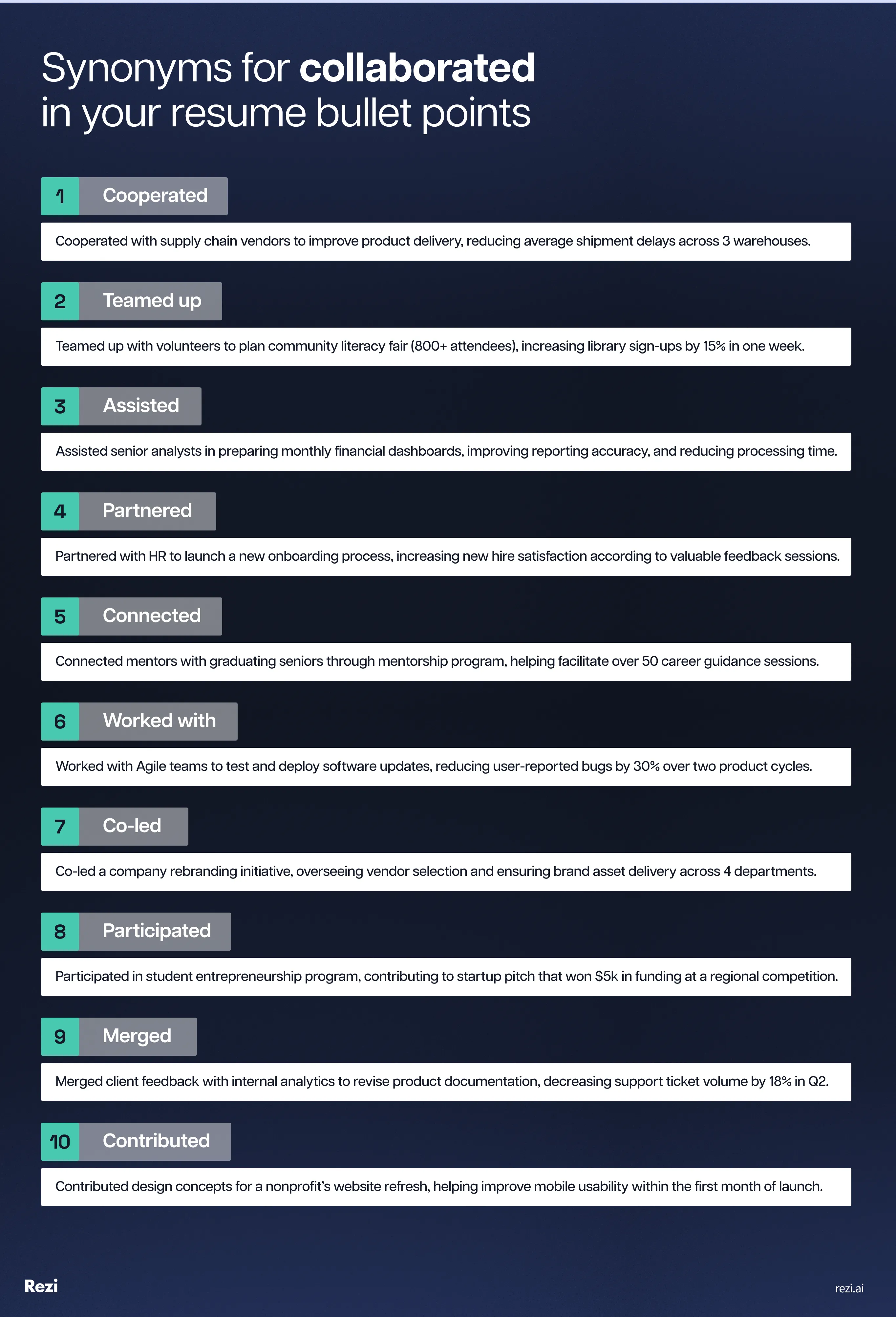Looking for resume synonyms for collaborate? Explore 50 alternative words with definitions, examples, and tips to strengthen your job application.



Collaboration means working with one or more people to achieve a common goal, such as planning an event, solving a problem, or building something new. On a resume, “collaborate” highlights teamwork, group projects, or your ability to work effectively with others in a professional setting.
While it’s a strong resume verb, it can feel repetitive or vague if overused. Were you really contributing to the team, or avoiding eye contact at the back of the room? Adding specific synonyms gives your resume more variety while offering a more concrete picture of your strengths and experiences.
Find the best “collaborate” alternatives to show off your skills. This guide will cover:
- The top “collaborate” synonyms for your resume.
- How to use alternative words to create more impact.
- A range of resume examples to show your collaboration skills.
Need help choosing the right words? Try our free AI Resume Builder to get customized writing suggestions and create an ATS-friendly job application in minutes.
50 Resume Synonyms for Collaborate
There’s a big difference between being part of a large project vs. collaborating one-on-one with an important client. Honesty is the best policy when detailing your contributions, and using the right words is a big part of that.
Check out these popular “collaborate” synonyms and similar words:
And here’s how to use them in your resume:

Do you work well with others? Find out more: The Best Interpersonal Skills for Your Resume
How to Replace “Collaborate” With Synonyms on Your Resume
Swapping out “collaborated” for a new word helps to mix it up, but don’t just copy in any random synonym. That first word in each bullet? It instantly tells recruiters what you did and how you did it, emphasizing the difference between leading, supporting, or strategizing with others.
Here’s how to replace “collaborate” with synonyms that carry more meaning.
Co-led vs. Collaborate
Using “co-led” demonstrates that you participated and shared ownership. It levels up your role from passive contributor to active decision-maker.
“Collaborated with the design team on website updates.”
“Co-led the website updates with the design team to align improvements with brand strategy.”
Partnered vs. Collaborate
“Partnered” conveys a closer working relationship with mutual accountability. Mentioning specific outcomes makes your contribution to the partnership more impactful.
“Collaborated with marketing to develop campaign materials.”
“Partnered with the marketing team to create dynamic campaign assets, resulting in an 18% increase in conversions.”
Coordinated vs. Collaborate
“Coordinated” suggests organization and responsibility in managing the process, not just being a passive participant.
“Collaborated with developers to test new features.”
“Coordinated with the development team to QA-test new features before release, ensuring 99% bug-free deployment.”
Assisted vs. Collaborate
“Assisted” is a solid choice if you held an entry-level or internship position. You’re being honest about not taking the lead, but clarifying that you were still involved in the process.
“Collaborated with HR on employee onboarding.”
“Assisted HR in developing an onboarding workflow, decreasing new hire ramp-up time.”
Teamed up vs. Collaborate
“Teamed up” feels more dynamic, working well to describe larger projects. You can use this term if you’re applying to a more informal and collective work environment.
“Collaborated with the sales team to generate leads.”
“Teamed up with sales to build lead generation strategies that resulted in a 20% increase in qualified leads.”
Co-authored vs. Collaborate
“Co-authored” implies a more involved contribution, often used in creative or research fields. It also hints at writing skills, strategy, and shared accountability.
“Collaborated with content creators to write blog posts.”
“Co-authored SEO blog content with writers, increasing organic traffic by 40% in 3 months.”
Worked closely vs. Collaborate
“Worked closely” keeps it simple but suggests meaningful connections. It also reflects your interpersonal skills and ability to form strong professional relationships.
“Collaborated with engineering on technical specs.”
“Worked closely with engineers to refine technical specifications, accelerating development timelines.”
Contributed vs. Collaborate
“Contributed” suggests you aren’t the type to stay silent in the back. It implies you’re willing to bring fresh ideas, suggestions, and feedback to the group.
“Collaborated with finance on quarterly budgeting.”
“Contributed to quarterly budgeting discussions with finance to find cost-saving opportunities.”
Supported vs. Collaborate
“Supported” reflects hands-on involvement, and listing specific actions shows exactly how you added value, not just that you were present.
“Collaborated with the QA team during testing phases.”
“Supported the QA team by tracking bugs, giving feedback, and ensuring release-readiness.”
Advised vs. Collaborate
“Advised” steps up your role from contributor to trusted voice. It shows that you brought insight and feedback, not just effort.
“Collaborated with leadership to implement new tools.”
“Advised leadership on tech changes and helped implement new tools to boost productivity.”
Aligned vs. Collaborate
“Aligned” signals strategic cooperation and intentional problem-solving. It shows you can work with someone to get on the same page and see things from their perspective.
“Collaborated with customer support to address client concerns.”
“Aligned with customer support to develop faster resolution paths, decreasing client escalations.”
Learn more about highlighting your people skills: Best Communication Skills for Your Resume
Best “Collaborated” Synonym Examples
You’ve probably heard that tailoring your resume is important — and it is. But that doesn’t mean rewriting the whole thing for every role. Sometimes, it’s about choosing the right words. Going for a leadership role? Words like “co-led” or “advised” show initiative and responsibility. Applying for an entry-level position? “Participated” or “contributed” might be a better fit.
Here’s how to choose the best “collaborate” synonyms for your expertise and industry.
1. Cooperated
“Cooperated” is a strong word that shows you can work respectfully and efficiently within structured teams. It implies you know how to follow protocols, take direction when needed, and work well with others to achieve shared goals. It’s handy in more formal industries where smooth coordination is essential.
Examples:
• Cooperated with different departments to implement new inventory tracking procedures
• Cooperated with teachers to develop inclusive after-school programs for at-risk students.
• Cooperated with supply chain partners to resolve delivery delays during peak season.
2. Teamed up
“Teamed up” has a collaborative, energetic feel that implies a proactive and enthusiastic approach to group work. It works especially well in creative industries, startups, nonprofits, and project-based roles, where rolling up your sleeves and joining forces is the name of the game. It suggests you’re someone who jumps in and adds value, not just tags along.
Examples:
• Teamed up with copywriters to launch a new brand campaign across three channels.
• Teamed up with a nonprofit to organize a community cleanup involving 200+ volunteers.
• Teamed up with classmates to develop a mobile app prototype and presented at the university pitch competition.
3. Assisted
“Assisted” is a versatile synonym that shows you supported a project or person, without necessarily leading. It’s great for early-career roles, internships, or when you played a hands-on role. It signals reliability, eagerness to help, and a collaborative spirit.
Examples:
• Assisted the marketing team with campaign reporting, including weekly analytics summaries.
• Assisted HR in organizing company-wide training sessions for 150+ employees.
• Assisted professors with research and data collection for a published academic article.
4. Partnered
“Partnered” conveys a sense of equal collaboration and alignment. It’s ideal for mid-to-senior roles, cross-functional projects, and client-facing positions. It shows that you worked alongside others as a trusted collaborator and had a stake in the outcome. Especially effective in marketing, business, and consulting.
Examples:
• Partnered with the product team to align feature releases with customer feedback.
• Partnered with clients to co-develop customized onboarding plans for enterprise software adoption.
• Partnered with external sponsors to coordinate a university research symposium.
5. Connected
“Connected” highlights your people skills and ability to bring individuals or groups together. It implies relationship-building, networking, or encouraging communication — ideal for roles in sales, community outreach, recruiting, or customer success. It’s a more human, interpersonal take on collaboration.
Examples:
• Connected sales and support teams to ensure consistent messaging and a seamless customer experience.
• Connected with local businesses to sponsor and support a student entrepreneurship fair.
• Connected clients with experts to deliver customized business solutions.
6. Worked with
“Worked with” is flexible, familiar, and easy to weave into almost any resume. It steers away from the formalities and shows collaboration without overstating your role. It works in nearly all industries and is especially useful to keep things general or describe a more relaxed relationship.
Examples:
• Worked with IT to implement single sign-on functionality across internal platforms.
• Worked with finance and operations to develop a quarterly resource forecast.
• Worked with fellow volunteers to coordinate fundraising events for the animal shelter.
7. Co-led
“Co-led” is powerful because it shows your leadership skills and key role in driving the effort. It’s perfect when you had real ownership but shared the responsibility with another person or team. Best for leadership roles and complex projects where collaborative leadership was essential to success.
Examples:
• Co-led the rollout of a new CRM platform across three departments, improving user adoption by 40%.
• Co-led student orientation, resulting in a 96% satisfaction rate among new students.
• Co-led weekly scrum meetings to prioritize tasks and unblock developers.
8. Participated
“Participated” is useful when you contributed to something but didn’t have a leading or organizing role. It signals engagement and teamwork skills without overstating your involvement. It works well for early-career professionals, internships, group projects, and volunteer work, especially in research, education, and nonprofit settings.
Examples:
• Participated in a range of workshops to brainstorm customer retention strategies.
• Participated in a mentorship program connecting undergraduates with industry professionals.
• Participated in university-led competitions focused on social impact entrepreneurship.
9. Merged
“Merged” is more niche, but it works well when you had a role in combining departments, systems, processes, or teams. It implies strategic thinking, change management, and cross-functional alignment. Best suited for roles where you were involved in integration or transformation.
Examples:
• Merged two regional teams into a unified Salesforce, standardizing processes and increasing efficiency by 18%.
• Merged overlapping CRM workflows to eliminate data redundancies.
• Merged student organizations to form a single cultural awareness initiative.
10. Contributed
“Contributed” highlights that you made a meaningful impact, even if you didn’t lead. It’s especially effective when paired with what you contributed, such as ideas, skills, or outcomes. It shows initiative, reliability, and willingness to support the group. Great for nearly all industries, especially if you’re trying to emphasize the value you added to a project.
Examples:
• Contributed to UX design improvements that reduced bounce rate by 22%.
• Contributed insights and analysis during product roadmap planning sessions.
• Contributed to planning efforts for a community outreach event attended by 400+ residents.
When You Should Still Use “Collaborate” in Your Resume
Collaboration is a key soft skill, right up there with communication and being a people person. While these are often essential in the workplace, anyone can claim to work well with others or hold a decent conversation. What matters is how you frame your experience and why your ability to collaborate makes you a stronger candidate.
Check out these expert tips to maximize your word choices.
- Use collaborative words in your work experience. Back up your synonyms with clear context, outcomes, or team dynamics. Saying you “partnered with engineering” in your resume work experience section is much stronger if you note why and what changed because of that collaboration.
- Avoid stacking multiple collaboration-based verbs. If every resume bullet point starts with “collaborated,” “assisted,” or “worked with,” it makes your role sound repetitive or too dependent on others. Mix in leadership verbs like “led”, “implemented”, or “owned” to show initiative.
- Stay honest. Always be transparent about your type of role and duties. If you played a support role, “assisted” or “participated” might be more accurate. But if you drove the outcome, go for “co-led,” or “partnered” to show shared authority or leadership.
- Use collaboration words to highlight soft skills. “Worked with stakeholders” is fine, but “Worked with stakeholders to redesign onboarding flows, reducing churn by 15%” adds substance. When highlighting resume soft skills, ensure there’s a hard skill or result nearby.
- Swap out “collaborate” when you need to vary your language. Repetition dulls your impact. If you use “collaborated” once, try “partnered,” “co-led,” or “engaged” next time to keep the reader interested and highlight nuance in how you worked with others.
- Be careful not to let “collaborated” overshadow your individual contributions. If every bullet is about what the team did, it can be hard to tell what you actually achieved. Show the outcome, then clarify your specific role in making it happen.
- Collaborative verbs are more powerful with metrics. Anyone can say they “worked with marketing,” but saying you “partnered with marketing to design email campaigns that boosted open rates by 35%” puts your teamwork in context and proves it was effective.
- Tailor your collaboration verb to the industry or role. “Teamed up” sounds great in startups or creative environments. “Corresponded” might fit better in consulting or government. Matching your word choice to your field shows awareness of tone and company culture.
Learn more about customizing your resume: How to Tailor a Resume to a Job Posting
FAQ
What is the definition of collaboration?
Collaboration is when two or more people work together toward a shared goal or outcome. It usually involves open communication, sharing ideas, dividing responsibilities, and contributing individual strengths. Collaboration is key to building solutions that benefit from diverse perspectives and skill sets in most professional settings.
What does collaborative mean?
“Collaborative” describes anything involving teamwork, mutual support, or shared effort. When someone has a collaborative mindset or work style, it means they’re open to others’ ideas, good at communicating, and comfortable in group settings. It also implies a willingness to contribute without needing full control — a trait valued in most modern workplaces.
What are the top collaborative antonyms?
The main antonyms of “collaborative” center around isolation, control, or lack of teamwork. Some top ones include: independent, solo, uncooperative, competitive, detached, and autonomous. Working independently isn’t a bad thing, but on a resume or in job settings, using these terms might imply you prefer to go it alone, which could be a red flag for highly team-driven roles.
What’s another word for work together?
Common synonyms for “work together” include collaborate, partner, coordinate, team up, or join forces. Each carries a slightly different tone. For example, “partnered” implies more responsibility, while “teamed up” feels like a group effort. Swapping in synonyms like these on your resume keeps your language varied and better tailored to the work you did.
What is another word for teamwork on a resume?
Instead of saying “teamwork” directly, you can use action-oriented words that show how you engaged in teamwork, like collaboration, group coordination, or team-based leadership, to give more context. These phrases demonstrate teamwork through what you did, rather than just stating that you’re “a team player.”
Lauren Bedford
Lauren Bedford is a seasoned writer with a track record of helping thousands of readers find practical solutions over the past five years. She's tackled a range of topics, always striving to simplify complex jargon. At Rezi, Lauren aims to craft genuine and actionable content that guides readers in creating standout resumes to land their dream jobs.



